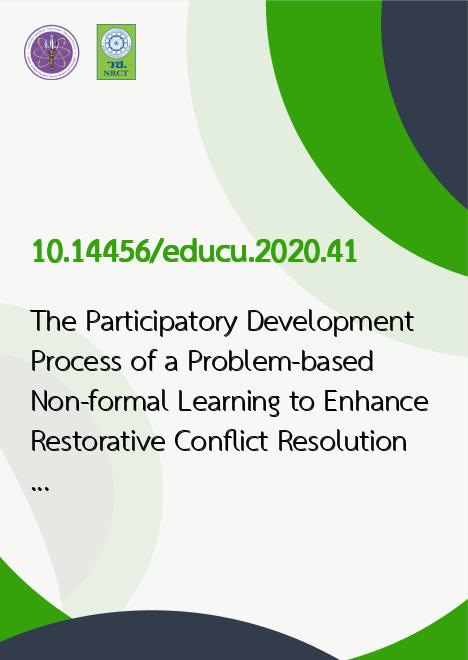
|
The Participatory Development Process of a Problem-based Non-formal Learning to Enhance Restorative Conflict Resolution Skills for Juvenile in Slums |
|---|---|
| รหัสดีโอไอ | |
| Creator | Atchareya Thirasarichote |
| Title | The Participatory Development Process of a Problem-based Non-formal Learning to Enhance Restorative Conflict Resolution Skills for Juvenile in Slums |
| Contributor | Weerachat Soopunyo |
| Publisher | Centre for Education Innovation, Print and Online Media |
| Publication Year | 2563 |
| Journal Title | Journal of Education Studies, Chulalongkorn University |
| Journal Vol. | 48 |
| Journal No. | 3 |
| Page no. | 407-427 |
| Keyword | non-formal education, restorative conflict resolution, participatory learning process, juvenile in slum, problem-based learning |
| URL Website | https://so02.tci-thaijo.org/index.php/EDUCU |
| Website title | Journal of Education Studies, Chulalongkorn University |
| ISSN | 2651-2017 (Online) |
| Abstract | The objective of this research was to conduct the participatory development process of a problem-based non-formal learning to enhance restorative conflict resolution skills for juvenile in slums. The methodology consisted of four steps namely, 1) the survey of needs of conflicting parties and involving people, reflection and discussion, 2) the selection of conflict resolution, 3) the observation, and 4) the evaluation. The participants of this study consisted of a pair of conflicting juveniles, involving 9 people namely friends, community members and 6 leaders. The setting was Wat Pho Riang community and Wat Amphawa community, Bangkok. The results of this study indicated that the juvenile conflicting pair and involving people exchanged their attitude, experience, and made collaboration work to achieve the goals by being open-minded. Thus, they had a chance to experience self-change and reduction of being themselves which led to successful implementation.Then the researcher synthesized results from the process. This process was based on the beliefs in the potential of juveniles in slums to learn the ways to change themselves for achieving self-resolution. The learning process consisted of five steps as follows: 1) Critical Reflective Practice, 2) Creative Planning, 3) Understandable Communication, 4) Participatory Change, and 5) Conclusions. |